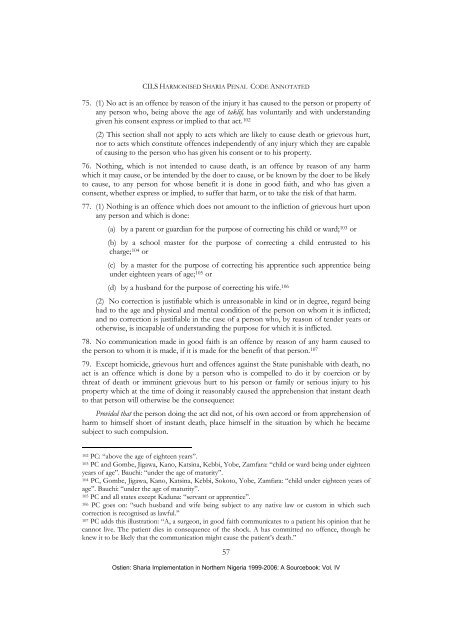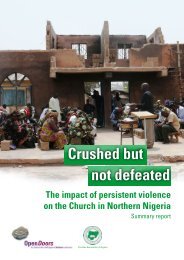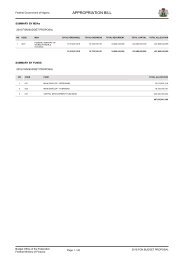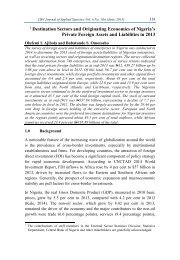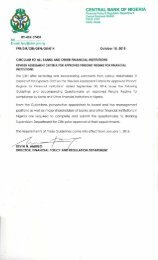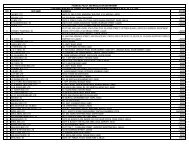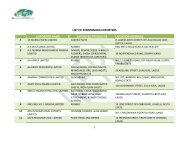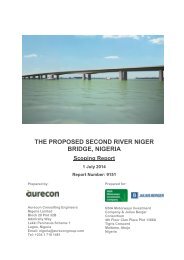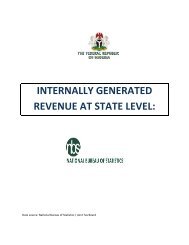vol_4_4_chapter_4_part_III
vol_4_4_chapter_4_part_III
vol_4_4_chapter_4_part_III
You also want an ePaper? Increase the reach of your titles
YUMPU automatically turns print PDFs into web optimized ePapers that Google loves.
CILS HARMONISED SHARIA PENAL CODE ANNOTATED<br />
75. (1) No act is an offence by reason of the injury it has caused to the person or property of<br />
any person who, being above the age of taklif, has <strong>vol</strong>untarily and with understanding<br />
given his consent express or implied to that act. 102<br />
(2) This section shall not apply to acts which are likely to cause death or grievous hurt,<br />
nor to acts which constitute offences independently of any injury which they are capable<br />
of causing to the person who has given his consent or to his property.<br />
76. Nothing, which is not intended to cause death, is an offence by reason of any harm<br />
which it may cause, or be intended by the doer to cause, or be known by the doer to be likely<br />
to cause, to any person for whose benefit it is done in good faith, and who has given a<br />
consent, whether express or implied, to suffer that harm, or to take the risk of that harm.<br />
77. (1) Nothing is an offence which does not amount to the infliction of grievous hurt upon<br />
any person and which is done:<br />
(a) by a parent or guardian for the purpose of correcting his child or ward; 103 or<br />
(b) by a school master for the purpose of correcting a child entrusted to his<br />
charge; 104 or<br />
(c) by a master for the purpose of correcting his apprentice such apprentice being<br />
under eighteen years of age; 105 or<br />
(d) by a husband for the purpose of correcting his wife. 106<br />
(2) No correction is justifiable which is unreasonable in kind or in degree, regard being<br />
had to the age and physical and mental condition of the person on whom it is inflicted;<br />
and no correction is justifiable in the case of a person who, by reason of tender years or<br />
otherwise, is incapable of understanding the purpose for which it is inflicted.<br />
78. No communication made in good faith is an offence by reason of any harm caused to<br />
the person to whom it is made, if it is made for the benefit of that person. 107<br />
79. Except homicide, grievous hurt and offences against the State punishable with death, no<br />
act is an offence which is done by a person who is compelled to do it by coercion or by<br />
threat of death or imminent grievous hurt to his person or family or serious injury to his<br />
property which at the time of doing it reasonably caused the apprehension that instant death<br />
to that person will otherwise be the consequence:<br />
Provided that the person doing the act did not, of his own accord or from apprehension of<br />
harm to himself short of instant death, place himself in the situation by which he became<br />
subject to such compulsion.<br />
102 PC: “above the age of eighteen years”.<br />
103 PC and Gombe, Jigawa, Kano, Katsina, Kebbi, Yobe, Zamfara: “child or ward being under eighteen<br />
years of age”. Bauchi: “under the age of maturity”.<br />
104 PC, Gombe, Jigawa, Kano, Katsina, Kebbi, Sokoto, Yobe, Zamfara: “child under eighteen years of<br />
age”. Bauchi: “under the age of maturity”.<br />
105 PC and all states except Kaduna: “servant or apprentice”.<br />
106 PC goes on: “such husband and wife being subject to any native law or custom in which such<br />
correction is recognised as lawful.”<br />
107 PC adds this illustration: “A, a surgeon, in good faith communicates to a patient his opinion that he<br />
cannot live. The patient dies in consequence of the shock. A has committed no offence, though he<br />
knew it to be likely that the communication might cause the patient’s death.”<br />
57


